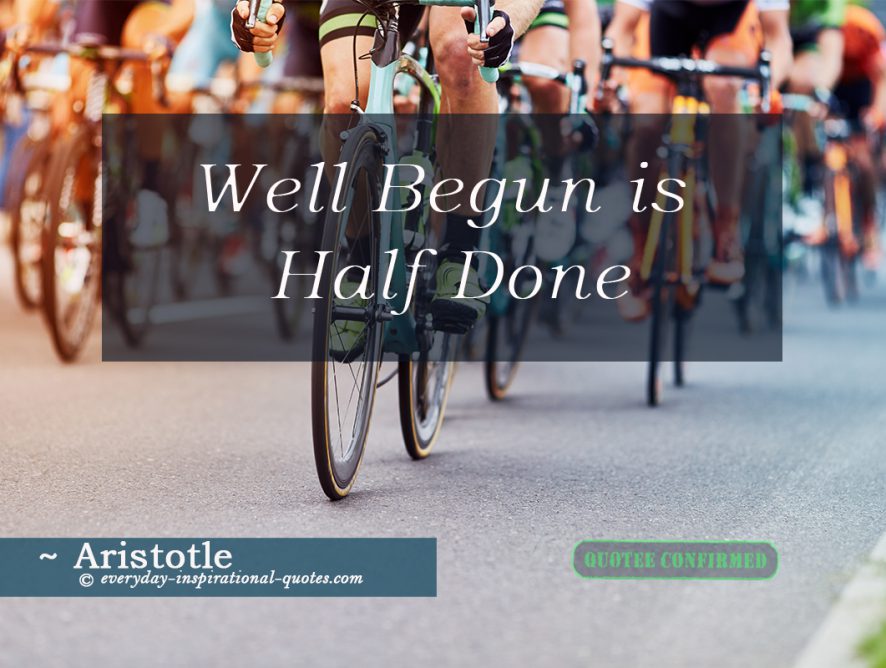The Greek Philosopher Aristotle mentions the quote “Well begun is half done” in his eight-book treatise called Politics. This is a collection of Aristotle’s writings which explain the his political views. Aristotle was of the opinion that the primary purpose for the existence of the government is to promote integrity which in turn promises a good life to it`s citizens. For his elaboration on various topics such as revolution, slavery, an ideal sate, forms of government and theory of constitution, Aristotle is known as the Father of Politics.
Aristotle wrote the aforementioned quote in the midst of explaining the importance of trifle matters in times of revolution. He highlights the enormity of evil beginnings and emphasizes that such evils especially the ones involving influential members of the society should be avoided. Not putting an end to such errors can yield poor consequences that the whole community will have to later face.
The mistake lies in the beginning—as the proverb says—‘Well
begun is half done’ ; so an error at the beginning, though quite small, bears the same ratio to the errors in the other parts… Politics by Aristotle, Book Five, Part IV
Aristotle`s quote, while simple, has a valuable lesson concerning the importance of starting a project, a task or even a daily discipline. That is, if something is started well, it becomes easier to complete that task. Conversely, if ample attention is not paid to the errors or difficulties at the beginning, it can become extremely long, tiresome or even impossible to accomplish the desired goal.
Who Was Aristotle
Aristotle was one of the greatest Greek philosophers born in 384 BCE in Greece. Owing to his vast knowledge of various subjects of sciences and arts, he was considered a polymath. He joined Plato’s academy at seventeen years of age and remained under his apprenticeship for some 20 years. After Plato’s death, he returned to Macedonia where he was a personal tutor to Alexander the Great.
Aristotle laid the foundation for his school called Lyceum. He gathered accomplished research students and held discussions in the Lyceum. Aristotle made significant contributions to philosophy, science (especially physics) and metaphysics. His work in the field of zoology remained unsurpassed till the mid of 19th century.
Aristotle’s teachings on ethics created a pathway for attaining happiness and satisfaction in life.
Aristotlean’s ethics is based on three things:
- Seeking Eudaimonia (well-being and happiness)
- Attaining virtue (a trait that enables a person to flourish)
- Putting virtue in our habits and actions
What Is The Meaning Of The Quote
The meaning implied by the aforementioned quote is that the ending of any task dependents on its beginning. If the beginning of a project is properly planned and executed well, one does not need to keep trying to invest extra effort into fixing issues that could have been foreseen.
Furthermore, this does not just apply to some big government or corporation projects, each and every one of us has some big goals or dreams, maybe its moving to another country, buying a house or starting a business. Whatever that goal may be, you should not just blindly throw yourself into action hoping that everything will work out just the way you imagined. Instead, you must start with research, you should ask yourself is my plan feasible? Do I have enough resources, time, patience to pull through the hard times.
Why you should always create a plan?
Creating a plan beforehand has many benefits and saves you from facing setbacks. Once you’ve chalked out a clear plan for yourself, you come to know the strengths and weaknesses of your approach. Knowing this helps you execute your plan in an effective manner by avoiding all the risks and potential harms.
Not having a clear plan before starting and doing things at the eleventh hour can set you up for various setbacks. Things that are done in a rush often end up in failure because when you’re rushing through things you are unable to comprehend the outcome of your decisions. This approach to life can often set you up for costly setbacks that are difficult to overcome.
Planning ahead gives you a bigger picture of everything and allows you to see things that are not feasible and/or not worth your time and effort. When this becomes clear to you, you don’t have to worry about facing something that is unexpected. This saves you from difficulties that are either expensive and/or hard to undo.
How to plan?
Now the question arises “how to plan effectively?”
These are some things that must be paid attention to when creating a plan:
- The first thing to do is check whether or not the task at hand has been done before. By analyzing this you can benefit from previous works that have been done and allow you to learn from the failures of others
- If someone before you has worked on something similar, you can check the feedback they received. After going through the feedback you can understand where they fell short and find ways to avoid it.
- An important thing when it comes to planning is to know the time you will take complete a task. Scheduling your workload effectively prepares you for unforeseen hurdles as well as helps you to manage work-life balance.
- Once done, the next thing to do is to break down your problem into milestones. Write down all the milestones and set a goal for each day.
- Now all you’ve to do is get down to work. Don’t forget to review your goals to check whether or not you are on track.

